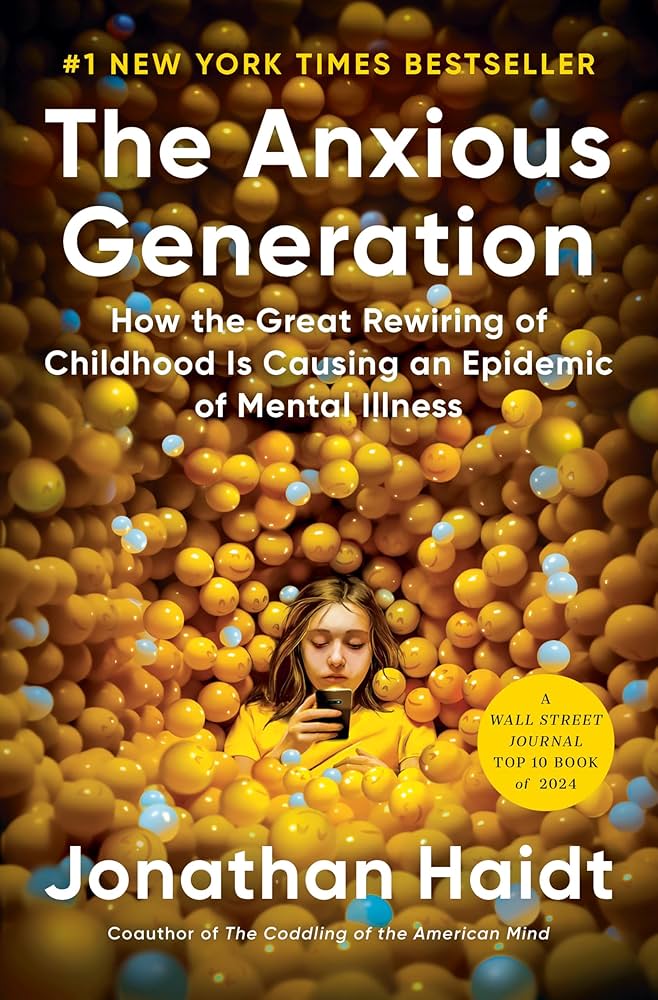“Adults in Gen X and prior generations have not experienced much of a rise in clinical depression or anxiety disorders since 2010, but many of us have become more frazzled, scattered, and exhausted by our new technologies and their incessant interruptions and distractions.”
The Anxious Generation: How the Great Rewiring of Childhood is Causing an Epidemic of Mental Illness, a book by Jonathan Haidt, discusses how social media has impacted the way people raise their children, more specifically, those considered Gen Z. It takes a deep dive into the mental health, social, and spiritual aspects of technology on young adults. The book also explores the steps we can take to shape the future of technology in the hands of developing minds.
Key takeaways
- Social media has a more significant impact on girls than on boys. Girls are more likely to compare themselves to what they see on social media. Many girls internalize so much hate for themselves that it can lead to a lack of self-esteem and the development of eating disorders, depression, and anxiety: “There is a clear, consistent, and sizeable link between heavy social media use and mental illness for girls, ” Haidt writes.
- Children are less likely to spend time with their friends in person. Due to technology, alienation rates have increased drastically. Children don’t go outside and play with their friends in their neighbourhood; they would much rather stay inside on their phones.
- Social media is significantly impacting people’s routines, including sleep patterns. According to Haidt, nearly half of the students in a study reported getting less than seven hours of sleep per night, which is a requirement for being fully functional. The lack of sleep can lead to developmental issues in children, which may hinder them from reaching their full mental and physical potential.
What I liked about this book
- Haidt is a credible source to discuss topics such as mental health and social struggles. The author has a Ph.D. in psychology and is an expert in social, positive, and moral psychology. The book is well-researched, and his points are backed by facts.
- This is a very timely book. In the generation of “iPad kids,” it’s essential that, as a society, we strive to find solutions to help children return to being children. An example solution discussed in the book is the “Let Grow” project, a movement promoting childhood independence in a safe manner by providing them opportunities for free play and self-reliance (mowing the lawn, play clubs, etc). We don’t want future generations to be worse than Gen Z has become, and this book is a significant first step to making a change.
- Haidt’s book explores many aspects of technology and its impact on children. It goes over social media impacts, the effects of technology on girls vs boys, pornography, video games, and mental illnesses. Haidt covers every area you can think of, making this an all-encompassing read and an excellent source of information.
What I didn’t love
- While the book is full of interesting statistics, the impact of those figures is somewhat obscured by the graphs and numbers. It was challenging to go through the book and have to read so many statistics, especially in the audiobook format.
- It’s repetitive. By the end of the book, each point was being hammered home in many different ways. It felt as though Haidt was unsure people would take his message the first time he said it.
- Haidt’s suggestions at the end of the book, while helpful, are not super realistic. Given how deeply social media and technology have been ingrained in society, breaking these patterns seems like an impossible feat. Many teachers, parents, and government officials may find it difficult to stray away from technology when it seems like the future of our world. In the perfect world, Haidt’s suggestions would be great.
Who should read it?
This is an essential book for parents, especially new parents. It’s also a good read for those who are considered part of “The Anxious Generation,” since it can promote self-reflection on their relationship with technology and social media. It also shows Gen Z what not to do if they eventually become parents.
Final verdict
While this book was a challenging and tedious read, it effectively discusses a sensitive subject. It conveys that technology has harmed us as a society, but also suggests ways to improve ourselves and help save future generations. It is a sad read, but an essential one.


